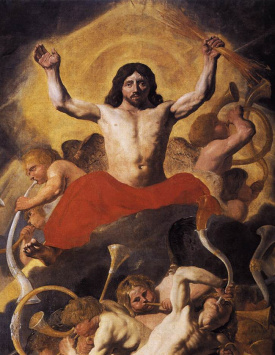According to the first book of Peter, a type of the judgment day has already begun for Christians during this life. It is long before the day of Jesus' Second Coming and the resurrection of the dead.
For the time has come for judgment to begin with the household of God; and if it first begins with us, what will be the end of those who do not obey the gospel of God? (1Peter 4:17, HBFV throughout unless stated)
To be more specific, what is the kind of assessment that begins with the household of God? Does verse 17 of 1Peter 4 refer to the sufferings and trials Christians have in this life or to a yet future judgment day of reckoning (cf. Revelation 20:11 - 15)?
In the verses immediately preceding verse 17, Peter tells Christians to endure their trials in life with a good spirit. The context indicates that God's judgment rests on believers now, as he judges how we react to our tests and trials in life, especially those that are not self-inflicted or deserved.
Judgment in 1Peter and in other places in the New Testament primarily refers to the process of evaluating a person's behavior from the time they are converted to the time they die.

What a Christian does during his or her life determines the outcome of their eternal life to come, how high or low their position in the kingdom of God will be, and so on.
Furthermore, if trials, tests, and suffering break our faith, and cause us to give up following God's way of life as a result, we cannot be saved and will await our fate on judgment day. For those who are truly Christians, what they do during this life determines how our heavenly Father will "sentence" them afterwards.
Faith and Obedience
To be more precise theologically, although faith is critical to entering the Kingdom, obedience or good works is needed to determine what will be one's rewards and responsibilities in that kingdom (1Corinthians 3:10 - 15).
If someone has no good works, but claims to have faith, that person is not "justified," since he does not have an effective, saving faith that will get him into that kingdom (James 2:14 - 26).
For the very small number of true Christians called during this present life, their "judgment day" has already begun, since their levels of faith and obedience exercised in this life will determine their eternal status (see Matthew 25:14 - 46, Luke 19:11 - 27).
Christians, though judged during their earthly life, will still stand before Christ to give an account for what they have done. The apostle Paul wrote in this regard when he stated we will all stand before God's judgment seat (Romans 14:10).
It should be noted that there are several texts in which God begins judgment or punishment for sin with His people first (see Isaiah 10:12, Ezekiel 9:6, cf. Amos 3:2). This is especially true in the book of Jeremiah, since at that time Judah was to be punished before Babylon and the other nations surrounding the Holy Land were (see Jeremiah 25:29 and chapters 46 - 51).
Humanity before God
The largest general period of judgment is described as occurring after the millennium ends.
And I saw the dead, small and great, standing before God; and the books were opened; and another book was opened, which is the book of life. And the dead were judged out of the things written in the books, according to their works (Revelation 20:12).
The people in this resurrection can still be saved, which is a wonderful truth that will surprise many who believe most of the dead go to Hell on the day they die.
The Bible teaches that the great majority of humanity, who never had a full chance to be saved during this life, will receive their first opportunity to be saved after they are resurrected (cf. John 6:44, Acts 2:39, Matthew 13:11 - 16, Romans 8:28 - 30).
When those who were never called or converted died, they did not go to heaven or hell, but simply remained unconscious (Ecclesiastes 9:5 - 6, 10) until the millennium of Christ’s rule on earth ends. For the "unwashed masses" in this second resurrection (Revelation 20:5, 12-13), they will receive a period of some years to repent and accept Jesus as Savior (Isaiah 65:17, 20).
The Bible reveals that the primary "judgment day" of Christians is the period from their conversion to their physical death.
For the countless billions of humans (past, present and future) who live a physical life without a full chance at understanding the gospel, who never are "enlightened" and "taste the good Word of God" (Hebrews 6:4 - 5), their day of judgment and reckoning is yet future. It will begin when they are resurrected and come before God's Great White Throne (Revelation 20:5, 11 - 13).